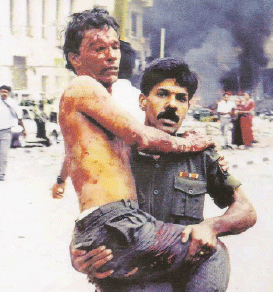- Due to lack of tangible evidence of death

Sunday, 07th September 2014
By Camelia Nathaniel
 Though it’s over five years since the successful conclusion of the war, there are still thousands of those who had disappeared and are unaccounted for, while their families, in the absence of tangible answers, are unable to put aside the suffering they have been, and still are undergoing. The Presidential Commission appointed to Investigate into Complaints regarding missing persons has so far received 14,471 complaints from civilians regarding their missing family members while a further 5,000 complaints had also been received from family members of military personnel.
Though it’s over five years since the successful conclusion of the war, there are still thousands of those who had disappeared and are unaccounted for, while their families, in the absence of tangible answers, are unable to put aside the suffering they have been, and still are undergoing. The Presidential Commission appointed to Investigate into Complaints regarding missing persons has so far received 14,471 complaints from civilians regarding their missing family members while a further 5,000 complaints had also been received from family members of military personnel.
Many theories have been put forward with regard to those who had gone missing, and speculation has been rife on what could have become of them, while the blame, primarily, has been placed on the security forces. The time frame of the Presidential Commission to inquire into cases of the alleged disappearances of persons in the Northern and Eastern Provinces has been amended to cover the period 1983 to 2009. Previously, the time period was from 1990 to 2009.
On a warrant issued under the signature of President Mahinda Rajapaksa, a Gazette notification was issued on 25 March 2014, in accordance with the provisions under the Commissions of Inquiry Act. While there has been differing views from various quarters whether an internal investigation should be held, there are others who have expressed doubt regarding the credibility of such an investigation. But just as much as there are those who believe an internal investigation lacks credibility, and would not reveal the truth about what had happened to these people, there are also concerns being expressed stating that an international investigation would accuse the security forces of being responsible for the missing persons.
However, despite the blame game being played by the government, the international community and the Diaspora, the parents, spouses and children of those who had gone missing are still struggling to come to terms with their loss, and they require answers, irrespective of who provides them.
Charges and counter charges
Although many Tamil parties and certain Diaspora organizations are said to be pointing fingers at the military and holding them responsible for the disappearances, there are many who claim that the LTTE had deliberately killed all their wounded and disabled cadres. Reportedly, there are eyewitness accounts of how the LTTE had gathered all their wounded cadres into buses and tractors and had blasted these vehicles, as the terrorists did not want to undertake the burden of having to care for them.
There are also accounts of the LTTE shooting civilians who had been trying to cross over to the areas controlled by the security forces while at the same time they had also been trying to hold onto the civilians as human shields to prevent the military from firing at them.
Almost all the family members of the missing persons’ who had filed cases with the Presidential Commission appointed to Investigate into Complaints regarding missing persons, said their children or family members had been taken away by the LTTE. It is a fact that the LTTE had demanded that every family release at least one member to fight with the terrorists. Despite the voluntary cadres who were part of the LTTE, the terrorists had also forcibly conscripted many child soldiers, ignoring the repeated calls to refrain from recruiting children to fight a war. According to sources, some of the children who had been conscripted had been as young as 11 years old.
Apart from those missing from the Tamil population, there are also over 5,000 military personnel who are still reported as missing.
Meanwhile, the Dead and Missing Persons Parent’s Front, an organization comprising around 15,000 family members of those who had gone missing during the conflict, had handed over a petition to the OHCHR regarding the call for an impartial investigation by the special panel appointed to investigate Sri Lanka (OISL) on the possible war crimes that may have occurred during the period 2002-2011, as well as other violations of human rights in the country. They also called on the High Commissioner to conduct an impartial investigation, and not be misled by parties with ulterior motives whose aim is to tarnish the image of Sri Lanka. Speaking to The Sunday Leader, the secretary/convener of the Dead and Missing Persons Parent’s Front, Ananda Jayamanna, said they had also met Navi Pillay during her visit to Sri Lanka. “Our organization represents the Tamils, families of soldiers and the Muslim families of missing persons. Irrespective of their race and religion, they have all lost their loved ones and the pain is the same for all. We have brought everyone to the same platform and have addressed their grievances.

There are some who believe their children who were abducted by the LTTE and forced to fight had disappeared at the hands of the military, while the others blame the LTTE for the disappearance of their loved ones. However, during the meeting held last week to mark International Day of the Disappeared, everyone agreed that this was not an issue that could be resolved by international parties but it should be resolved domestically, by addressing the grievances and issues of all the parties,” he said.
LTTE killed their cadres
The Sunday Leader also contacted the president of the organization, Mudiyanse, who had lost his son during Operation Jayasikuru. “My son served the Navy and was deployed on the frontlines at the time. He died in the battlefield on 16 May 1998, when their troop came under attack by the LTTE. My older son is also serving the Navy. I was a member of the army, having joined the force in 1956. After I completed my term of service, I retired. However, during the height of the war, I rejoined the army and in 1984, I was posted in Jaffna.
“Having been in the frontlines, I have seen a number of persons who were killed by the terrorists. I believe that a good number of the missing persons could have been among those I had seen being killed by the LTTE. The terrorists attacked most of our camps, especially in Elephant Pass and Killinochchi. Around 3,000 soldiers disappeared during these attacks in Elephant Pass as the LTTE surrounded the area where we were positioned and attacked us. Initially, there were 18 camps in the Jaffna Peninsula but eventually, only Palaly and Velvettithurai remained under our control.
“Further, the three-storeyed police building in Chavakachcheri was razed to the ground when the terrorists placed explosives there, killing all the police personnel who were on duty at the time. From what I have seen with my own eyes, the military never attacked any civilians as there was no animosity between them and us. On the other hand, if that was the case, the question is, why did our soldiers sacrifice their own lives trying to save the civilians who were fleeing the LTTE controlled areas? Further, the LTTE were so brutal that they simply killed all their own cadres who had fought for them,” he explained.
However, there are some who still refuse to accept that their loved ones may have been killed during the conflict as they have no physical evidence. Hence, they do not want death certificates to be issued as they feel their loved ones may still be alive. Therefore, the government has come up with a proposal to draft legislation to grant a ‘certificate of absence’ to the relatives of those who had gone missing in lieu of death certificates for their missing loved ones.
While a credible investigation to determine the fate that befell those who are reported missing is of paramount importance, it should not once again create issues among the various communities.
The whole country has suffered enough and it is time to put the past behind us and focus on building a united and peaceful Sri Lanka.
From : http://www.thesundayleader.lk/2014/09/07/families-of-missing-persons-still-in-limbo/




